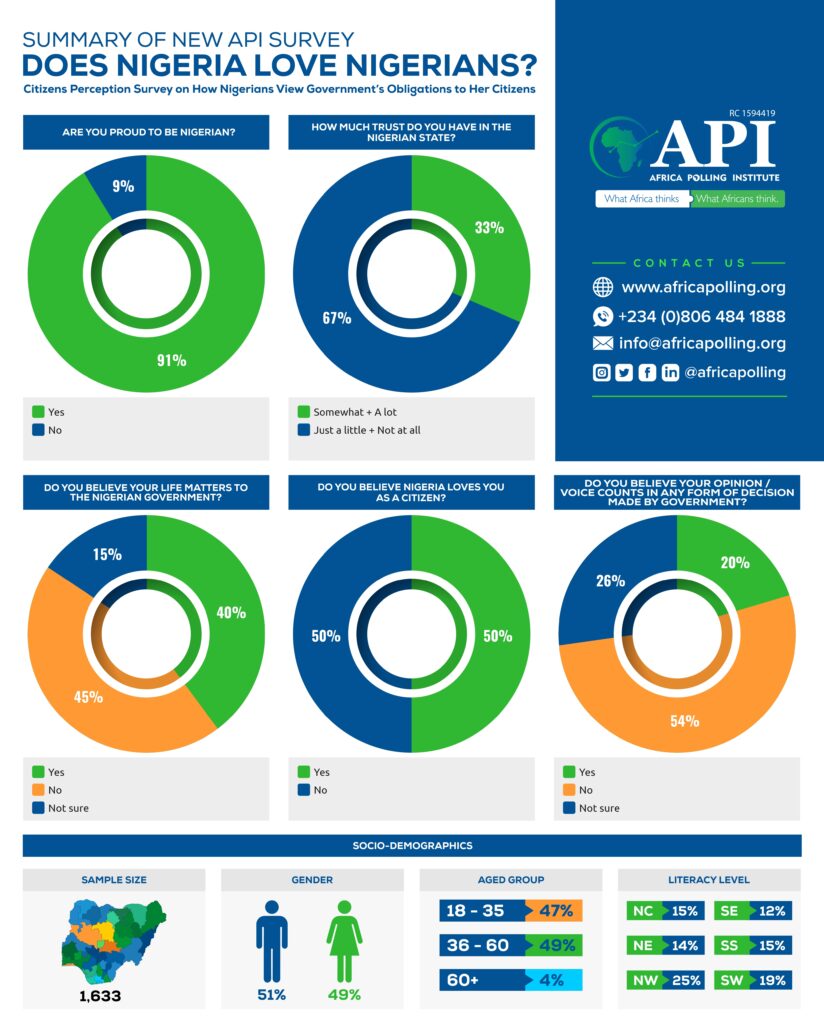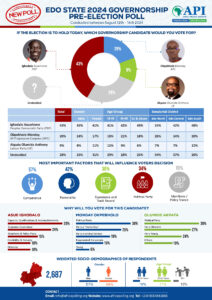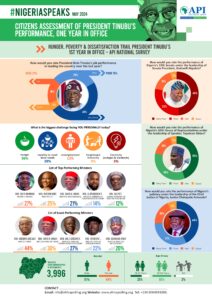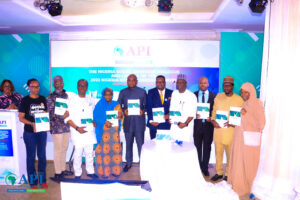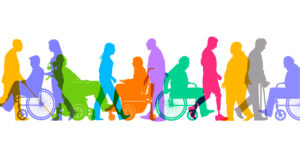Citizens urge government to focus on policies on Employment, Security and Good Governance
Abuja, Nigeria, September 17, 2020 – A new survey report released by Abuja-based opinion research think-tank, Africa Polling Institute (API), has highlighted existential gaps in Nigeria’s Social Contract between the government and the citizenry. The survey titled: “Does Nigeria Love Nigerians? A Citizens Perception Survey on How Nigerians View Government’s Obligations to Her Citizens” revealed that while majority of Nigerians (91%) remain proud of being Nigerians, there’s very little trust expressed by citizens towards the government. From the findings, 75% of Nigerians said they have benefitted absolutely nothing from the government in the last five years, while 54% say their voice and opinions do not count in government decisions-making. Citizens therefore advised the government to focus its attention on policies targeted at creating employment, improving the state of security, promoting good governance, empowering citizens and strengthening the quality of education.
The nationwide survey was conducted by API in the month of August 2020 to gauge public opinion on how Nigerians view the obligations of the state to her citizens. All interviews were conducted via telephone, using a Stratified Random Sampling technique. A total of 1633 completed interviews were captured in this survey out of 5784 calls made, representing a response rate of approximately 28%; and the sample consisted of 51% Male versus 49% Female respondents, all aged 18 years and above. The interviews were conducted in five major languages: English, Pidgin, Hausa, Igbo and Yoruba; and geographic quotas were assigned to ensure the selection of a nationally representative sample proportionately covering all senatorial districts and states, including the FCT.
Key Findings
Putting citizens at the heart of economic and development policies is one way of assessing a country’s love for her citizens. The main purpose of the State is the utmost realization of good life for all its citizens. As observed by World Bank (2018), Citizen-focused public service delivery measures the extent to which the needs and aspirations of the citizens are captured in government policy decisions. However, given the current economic realities in Nigeria, it is uncertain to conclude whether or not Nigerians believe that the government (at Federal, State and Local Government levels) loves and cares about the welfare of the citizenry. Unravelling this knot can help us answer questions regarding the viability of the social contract that exists between the government and the Citizenry. It is pertinent to examine the extent of the country’s love for her citizens vis-a-vis citizens patriotism to the nation within the framework of the social contract theory. The main thrust of the social contract theory is that the essence of government is to protect and enhance citizens’ well-being in exchange for their support and loyalty to the state. Within the framework of the social contract between Nigeria and Nigerians, this perception survey was designed to be carried out in two phases. The First Phase, which forms the fulcrum of this present survey report, centers on the government’s obligations to the citizens. The Second Phase, to be released in a subsequent series, would evaluate citizens responsibilities to the country.
The survey asked Citizens 10 Key Questions, ranging from whether or not they are proud of being Nigerian, do they believe Nigeria loves them, their level of trust in the Nigerian State, what they have benefitted from being Nigerians, if they believe their life matters to the Nigerian government, if their voice counts to government decision-making, if the government would come to the aid of citizens who encounter problems abroad, care for the elderly, equal opportunity for people living with disabilities and areas that government should focus its attention at reinforcing in order to add value to the lives of Nigerians.
Proud of Being Nigerian
Firstly, citizens were asked if they are proud of being Nigerians. Overwhelmingly, the survey reported that 91% of Nigerians affirmed that they are proud of being Citizens of Nigeria.
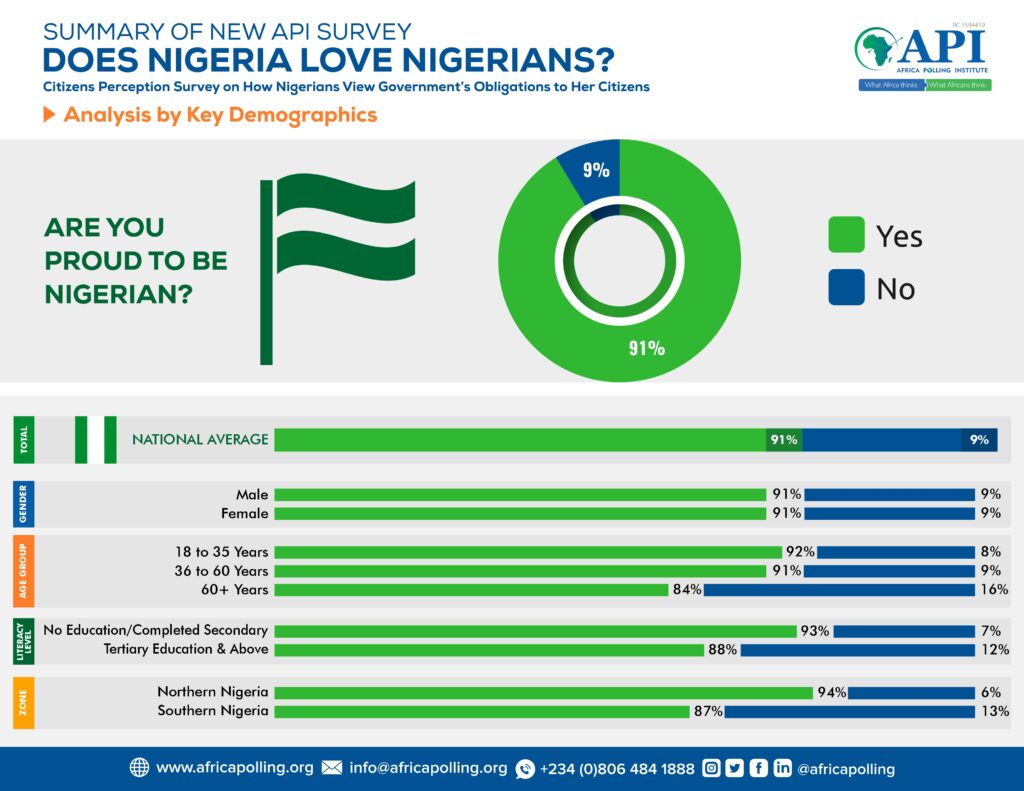
Level of Trust in the Nigerian State
This was followed by the question to ascertain the level of trust that Nigerians have in the State. The findings revealed that despite the majority of Nigerians who said they are proud of being Nigerians, only about a third of the Citizens (33%) express some or a lot of trust in the Nigerian State, the majority (67%) expressed very little to no trust whatsoever in the country. In addition, disaggregated data showed that there were more Female (68%) than Male (65%) respondents with little to no trust for the State. Also, there were more Citizens based in the Southern Nigeria (70%) with little to not trust in the State, in comparison with Citizens based in Northern Nigeria (63%).
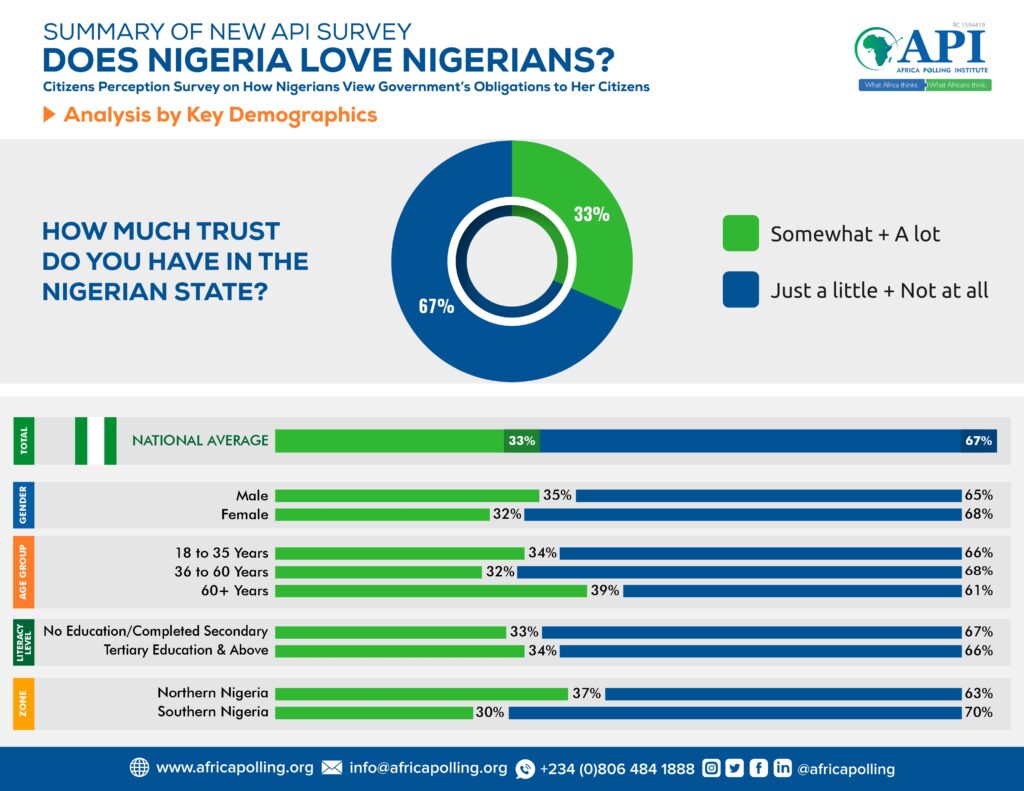
What have Citizens benefitted from the country in the last 5 years?
Then Citizens were asked what they have benefitted from being Nigerians in the last five years. The findings revealed that a significant majority of Nigerians (75%) were of the opinion that they had benefitted absolutely nothing in the last 5 years. However, a few citizens identified improved Security (7%); government empowerment programme (5%); and access to free education (3%) amongst others.
Does the Nigerian Life Matter to the Government?
Furthermore, in terms of citizens’ viewpoint on the importance of their life to the Nigerian state, the survey showed that 60% of Nigerians either do not believe their lives matter to the Nigerian government or are simply unsure. This finding clearly highlights an existential gap in government’s ability to protect the lives and properties of her citizens. On the contrary, 4 in 10 Nigerians (40%) said they believe that their lives matter to the government. This finding has been corroborated in the literature by several scholars such as Ogunnowo and Joshua (2019), Akinrefon, et. al (2018), Ebegbulem (2019) and Asadu, (2020), who argued that Nigerian lives do not matter to the Nigerian government, given the government’s poor response to various issues pertaining to citizens wellbeing and protection.
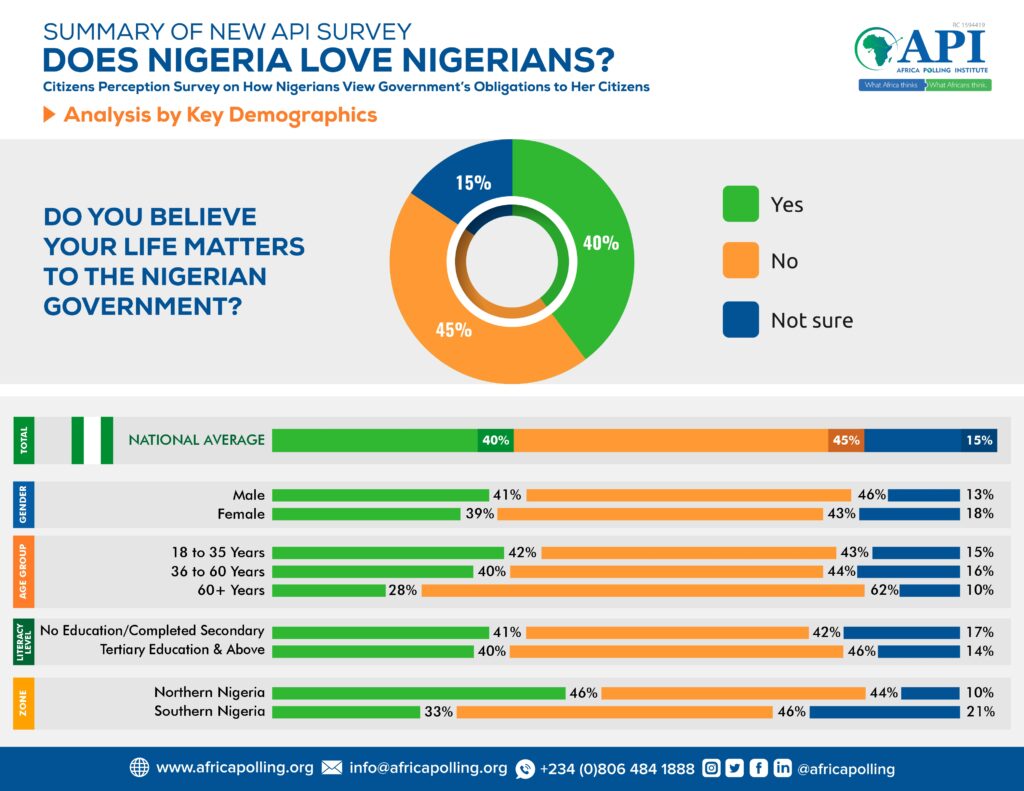
Does the Voice of the Nigerian Count in Government Decision-Making Process?
Citizens were also asked if they believe their voice or opinions count to the government in terms of decision-making. Overwhelmingly, about 8 in 10 Nigerians (80%) either disagreed (54%) or were simply unsure (26%) that their voices and opinions count in government decision process. On the other hand, only about 2 in 10 respondents (20%) said they believe that their opinions count in the decision-making process.
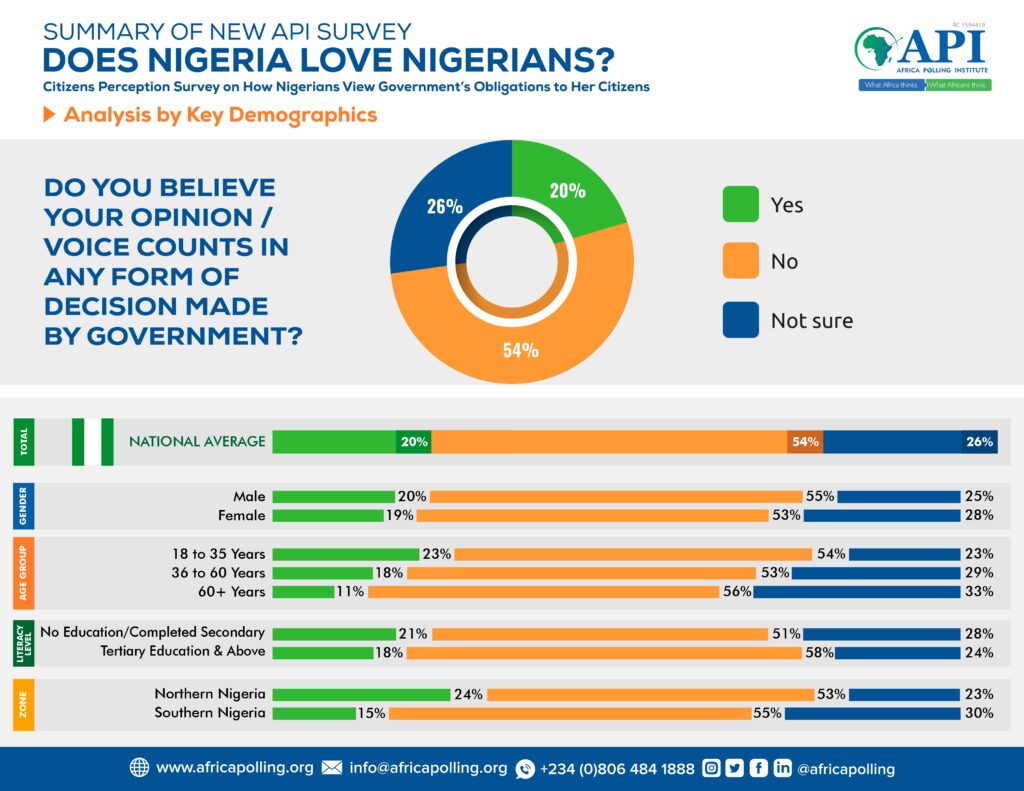
Would the Nigerian Government Come to the Aid of Citizens Abroad?
Citizens were also asked their opinion on whether or not they believe the Nigerian Government would come to their aid in case they encounter problems while out of the country. From the response, about 4 in 10 respondents (42%) stated that they do not believe the Nigerian government would come to their aid if they encountered a serious problem abroad. This was followed by 32% who were simply unsure if the government would come to their aid. On the contrary, only about 28% of respondents thought that the Nigerian government would come to their aid if they encountered a problem abroad.
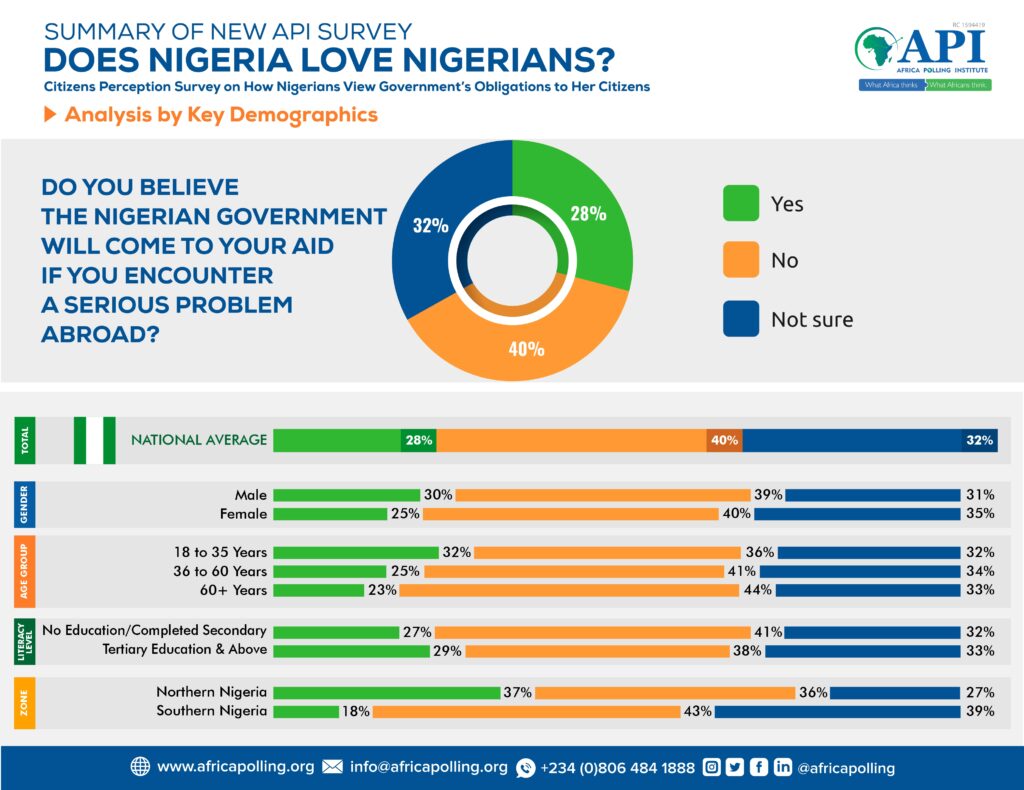
Does the country care enough for elderly citizens?
According to the Population Reference Bureau (2012), the elderly (aged 60 years and above) make up 3.1% or 5.9 million of Nigeria’s total population. With this in mind, citizens were also asked if they believe the country cares enough for elderly citizens in the society. From the result, almost 8 in 10 Nigerians (79%) objected that the country cares enough for the elderly. On the contrary, only a few of the respondents (21%) were of the opinion that the country cares enough for the elderly.
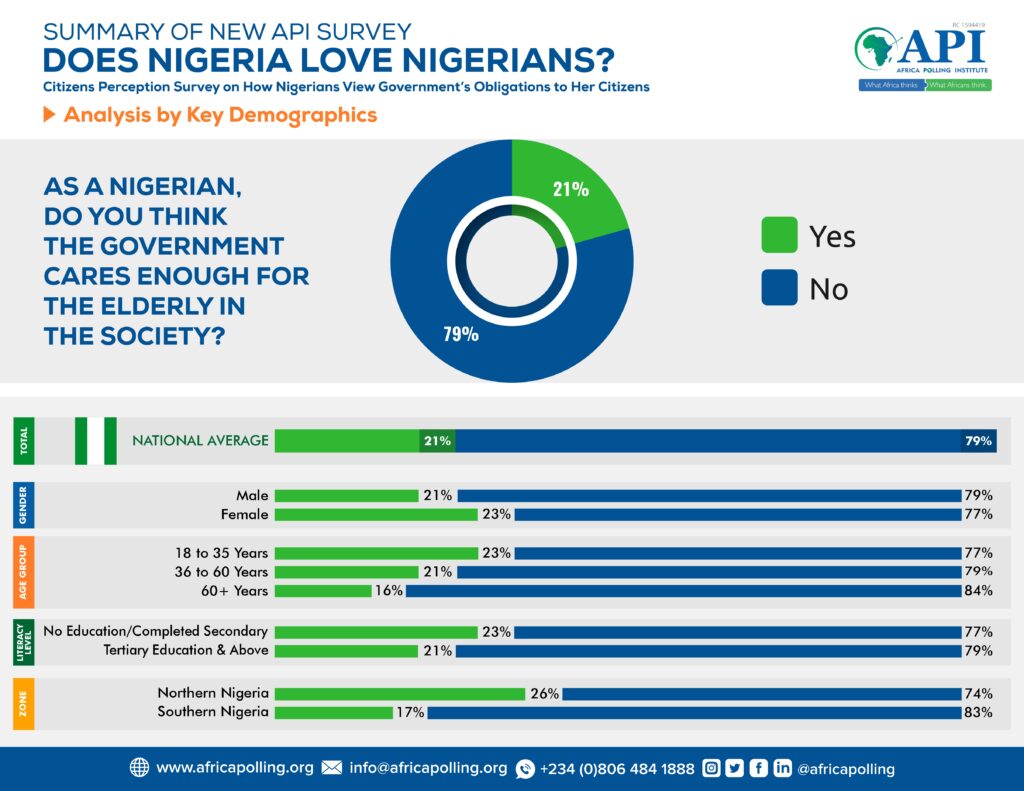
Does Nigeria Love Her Citizens?
Lastly, the survey attempted to aggregate the thoughts of Nigerians by asking them a more pointed question: Do you believe Nigeria loves YOU as a Citizen. Interestingly, the findings revealed mixed feelings as equal proportion of the citizens queued on both side of the response. In particular, while 50% of the respondents believe that the country loves them as citizens, an equal percentage (50%) of respondents also believe that the country does not love them as citizens. However, a critical look at the responses across socio-demographics revealed that while there was equal proportion of citizens who agreed or disagreed that Nigeria loves them, same cannot be said across gender, age-group and literacy levels. From the result, there were slightly more Male (52%) respondents who believe that Nigeria loves them as citizens, compared to Female respondents (51%) who believe otherwise. Also, respondents aged 60 and above expressed a stronger opinion that Nigeria does not love them as citizens. In addition, the data showed that there were more respondents in Northern Nigeria (57%) who believe that the country love them; compared to 57% of those in Southern Nigeria who believe that the country does not love them as citizens.
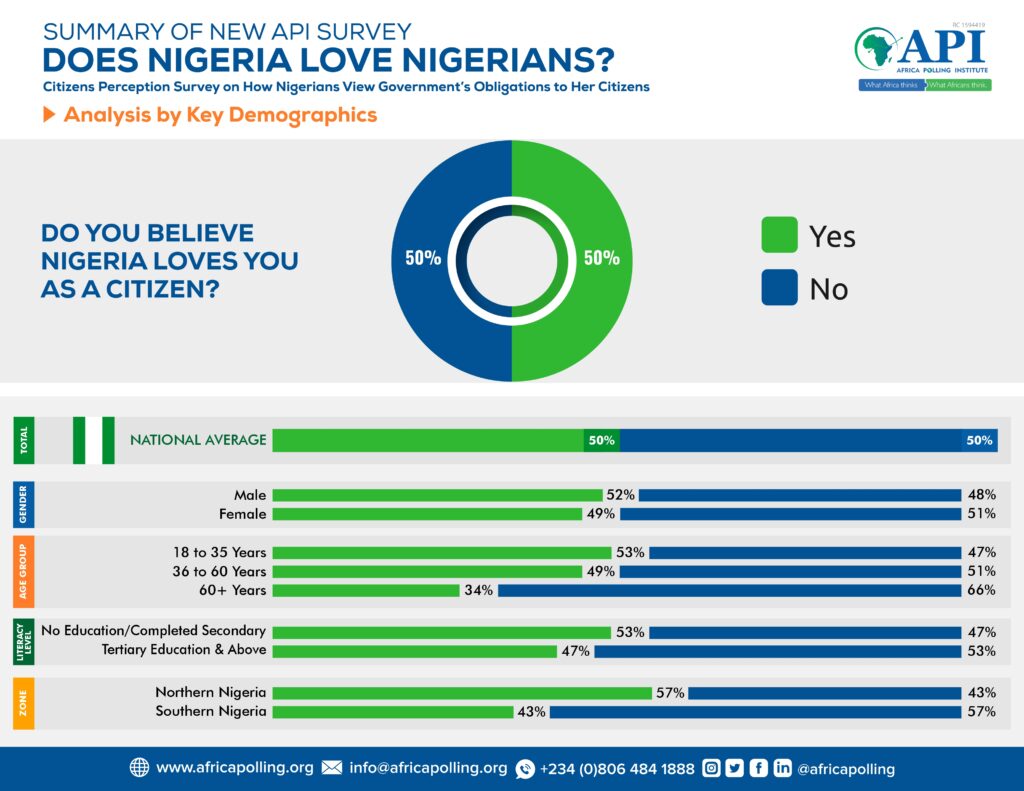
What Areas Should Public Policy Be Focused at Addressing?
In concluding the survey, citizens were then asked to suggest areas that government should focus its attention to in order to make life better and more conducive for the average Nigerian. The result revealed that the top five priority areas identified by citizens are: Employment Policies (30%), Security Policies (21%), Policies on Good Governance (18%), Empowerment Policies (15%) and Education Policies (12%), amongst others.
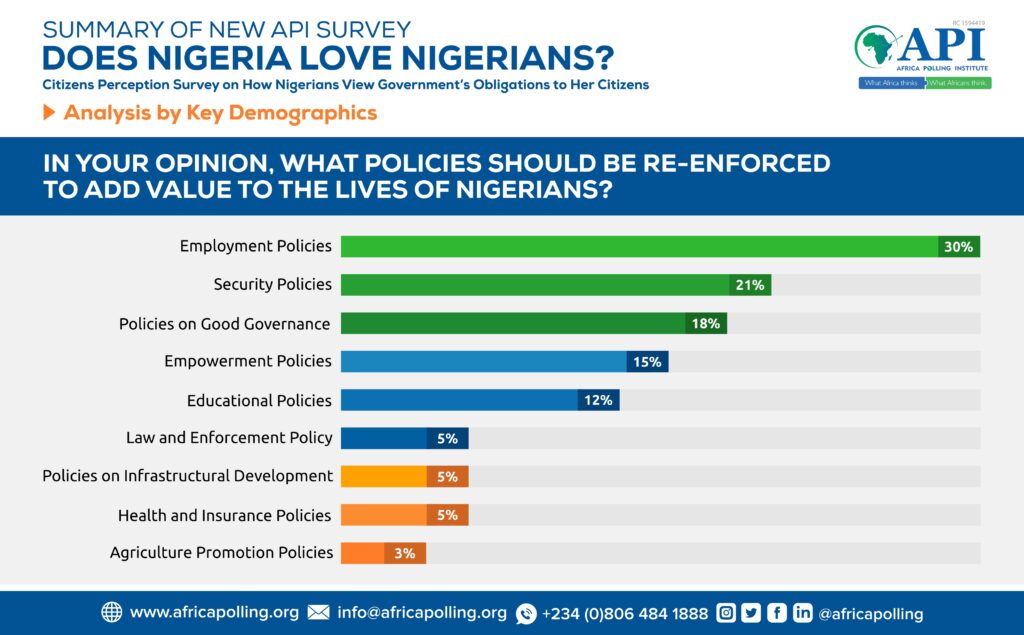
Survey Summary
In summary, this latest Citizens Perception Survey (CPS) by API highlights existential gaps in Nigeria’s Social Contract between the government and the citizenry. It is clear that while Nigerians are proud of being citizens of the country (as evidenced by 91%), there are key issues with trust in the Nigerian state, particularly as 75% of Citizens surveyed said they have benefitted absolutely nothing from the country in the last 5 years. More so, significant proportion of the general public do not believe their lives matter to the Nigerian government, neither do their opinions count in public policy design, implementation and decision-making. There is also the general consensus that the country does not provide adequate care for its senior citizens, those with terminal diseases and people living with disabilities.
It is therefore imperative that a lot needs to be done on the part of government to regain the trust of its citizens and rebuild the seemingly broken social contract; which have necessitated in civil unrest in parts of the country and an increase in social vices such as domestic violence, sexual abuse and a spike in overall crime rate. Nigerians have spoken in clear terms – government should focus its attention on policies targeted at creating massive employment opportunities across the country to engage the bulk of Nigeria’s unemployed population, especially the youths, who make up about 70% of the country’s population. This effort will unarguably help eschew the tendency of youth indulging in violent extremism and becoming handy tools in the hands of politicians who sponsor political thuggery and election violence. Also, policies focused on improving the heightened spate of insecurity in the country and promoting good governance and anti-corruption should be given urgent attention.
In conclusion, we recommend that occasional interface between the youths and the government at various levels be sketched through a website logic template, where their plights and disaffection with the Nigerian state may be captured and aggregated. This will help assuage the myriads of social challenges that they are faced with as a result of their socioeconomic shortcomings. An annual national conference on “Youth Participation in Governance” should be instituted and led by the National Orientation Agency (NOA) in collaboration with the National Youth Council (NYC) and the National Association of Nigerian Students (NANS) to help dampen the frightening disappointments of Nigerian youth in the country and their leaders.
Dr. Bell Ihua
Executive Director, Africa Polling Institute (API)
